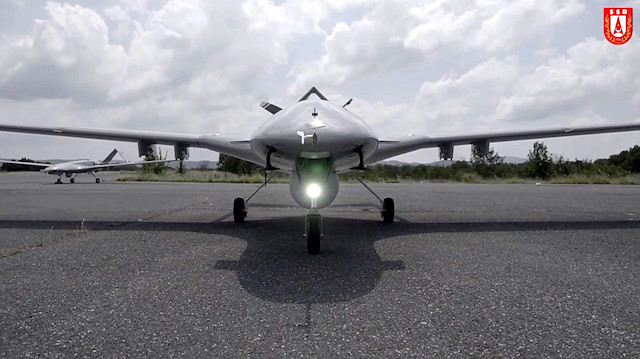
For first time in the world, Turkey uses drones as primary element in air strikes in Syria's Idlib, says defense expert
Turkey’s extensive deployment of armed drones in its fight against Syrian regime forces in Idlib province has put forward a "new military doctrine in the world," said a defense expert.
"For the first time in the world, drones were used as the primary element in air strikes during Turkey's Operation Spring Shield," said Bahri Mert Demirel, a defense industry expert in Turkey.
The use of drones in Syria in this manner "has put forward a new military doctrine not only in Turkey but also in the world's literature on warfare," he told Anadolu Agency.
Turkey launched Operation Spring Shield on Sunday after 34 Turkish soldiers were martyred in Idlib in an airstrike by forces of the Bashar al-Assad regime in late February. The soldiers were stationed there as part of a deal reached in 2018 with Russia to protect the civilian population and counter-terrorist groups.
Turkey previously used armed drones in Syria during Operation Euphrates Shield (2016), Operation Olive Branch (2018) and Operation Peace Spring (2019), but in these operations, the drones were deployed before operations to launch intense air attacks, he said.
For the first time, Turkey used armed drones as the primary element in Operation Spring Shield, he said, adding Turkey’s armed forces have not yet launched a ground attack in Idlib as part of the operation.
Turkish forces have neutralized 3,138 regime elements in Syria since the start of Operation Spring Shield and destroyed 151 tanks, 47 howitzers, three jets, eight helicopters, three drones and eight air defense systems, according to the Defense Ministry.
- Drone usage
Speaking on the purpose of using drones on the battlefield, Demirel said in general, unmanned aerial vehicles (UAVs) and unmanned combat aerial vehicles (UCAVs) are intended to be used as close air support.
Apart from this, they are used to gather electronic and signals intelligence and are also deployed as a support element for other air force elements, said Demirel, who has authored several research papers on the defense industry.
He said drones have been used for years to hit targets on the ground.
When it comes to Turkey's Operation Spring Shield, drones took the leading role while other types of fighter aircraft were of secondary importance, he said, adding Turkish F-16 fighter aircraft were only used in a limited manner.
During the Operation Spring Shield, Ankara has deployed both Bayraktar TB2 and Anka model UAVs, he said.
- Vital role of electronic warfare systems
Demirel also underlined that Turkey's electronic warfare systems have played a vital role in allowing Turkish armed drones to destroy Syrian air defense systems despite Idlib's airspace being closed.
Video footage circulated on social media and claimed to have been shared by the Turkish Defense Ministry showed that an active Russian-made Pantsir air defense system was successfully destroyed by Turkish military drones in Operation Spring Shield.
"Pantsir could not perform its duty in Syria because Turkey carried out very serious electronic warfare and deployed radar electronic attack systems including KORAL to intercept and deceive radar systems in Syria," he said.
Meanwhile, Turkey’s armed forces currently do not have drones that are capable of launching air to air attacks on Russian and Syrian aircraft.
Turkey realized its program of developing and producing drones over a short span of 10 years. With these products, the Turkish armed forces have gained serious experience through operations in Syria and Iraq.
Turkey has the most extensive operational capabilities and experience in the use of drones among European countries.
- Turkey's operations in Syria
Since 2016, Turkey has launched a trio of successful anti-terrorist operations across its border into northern Syria to prevent the formation of a terror corridor and enable locals to live peaceful lives: Operation Euphrates Shield, Operation Olive Branch and Operation Peace Spring.
Turkey announced on Sunday a new offensive in northwestern Syria, Operation Spring Shield. It came after at least 34 Turkish soldiers were martyred and dozens injured in an Assad regime airstrike last month in the Idlib de-escalation zone just across Turkey’s southern border.
In 2018, Turkey and Russia agreed to turn Idlib into a de-escalation zone in which acts of aggression were expressly prohibited.
But the regime and its allies, including Iranian-backed forces, have consistently broken the terms of the ceasefire, launching frequent attacks inside the territory.
More than 1,300 civilians have been killed in the de-escalation zone in such attacks, sending 1.7 million refugees towards Turkey's border with Syria.
Hello, the comments you share on our site are a valuable resource for other users. Please respect other users and different opinions. Do not use rude, offensive, derogatory, or discriminatory language.
The floor is all yours.








